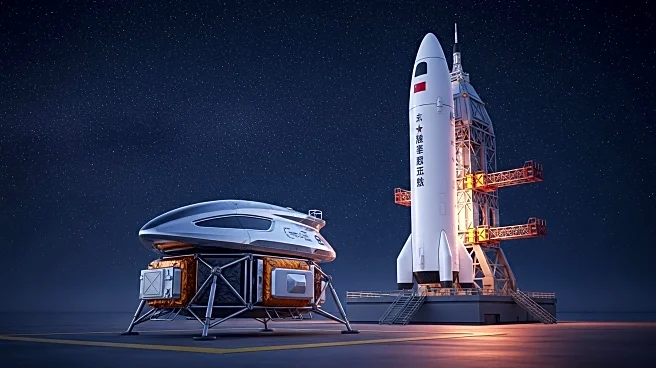What's Happening?
China is gearing up for a series of significant tests and launches in the final quarter of 2025, which are crucial to its crewed moon program and commercial rocket initiatives. The China Aerospace Science and Technology Corporation (CASC) has been actively testing components for the Long March 10 rocket, including static fires of a shortened first stage. Additionally, the Mengzhou crew spacecraft is set for an in-flight escape test, following a successful pad abort test in June. These developments are part of China's broader ambition to land astronauts on the moon by the end of the decade. The country is also preparing for the debut flights of several new rockets, including the reusable Long March 12A and commercial rockets like the Zhuque-3 and Tianlong-3.
Why It's Important?
These advancements in China's space program have significant implications for the global space industry. China's focus on reusable rocket technology and crewed lunar missions positions it as a formidable player in space exploration, potentially challenging the dominance of the United States and other space-faring nations. The successful development and deployment of these technologies could lead to increased competition in the commercial space sector, influencing global market dynamics. Moreover, China's progress in space exploration could spur technological innovations and collaborations, impacting industries reliant on satellite technology and space-based research.
What's Next?
As China continues to advance its space capabilities, the international community will be closely monitoring its progress. The upcoming tests and potential launches of new rockets will be critical in demonstrating the reliability and effectiveness of China's space technology. Success in these endeavors could lead to increased investment and interest in China's space program, as well as potential partnerships with other countries. Additionally, China's achievements may prompt other nations to accelerate their own space exploration efforts, leading to a new era of space competition and collaboration.
Beyond the Headlines
China's advancements in space technology also raise questions about the geopolitical implications of its growing capabilities. As China seeks to establish a presence on the moon, there may be concerns about the militarization of space and the need for international regulations to ensure peaceful exploration. Furthermore, China's focus on reusable rockets could drive down the cost of space access, making it more feasible for smaller nations and private companies to participate in space activities. This democratization of space could lead to a more diverse and competitive space industry.









